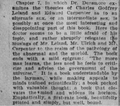History of LGBTQ Terms (USA): Difference between revisions
From LGBTQIA+ Archives Wiki
Archiveadmin (talk | contribs) (Created page with "This page follows the evolution of queer language (English) in the United States as used by general society and queer society, both casual terms and derogatory terms. = 19th...") |
Archiveadmin (talk | contribs) No edit summary |
||
| (4 intermediate revisions by the same user not shown) | |||
| Line 1: | Line 1: | ||
This page follows the evolution of queer language (English) in the United States as used by general society and queer society, both casual terms and derogatory terms. | This page follows the evolution of queer language (English) in the United States as used by general society and queer society, both casual terms and derogatory terms. | ||
=== Related Pages === | |||
* [[History of Anti-LGBTQ Pejorative Terms]] | |||
= 19th Century = | = 19th Century = | ||
* Intermediate Sex | |||
* Third Sex | * Third Sex | ||
* Urning/Uranian | |||
= 20th Century = | = 20th Century = | ||
* Intermediate Sex | * Gay | ||
* Bisexual | |||
* Lesbian | |||
* Transgender | |||
* Transsexual | |||
= Gallery = | |||
=== Usage of "Intermediate Sex" === | |||
<gallery> | |||
File:1907-11-23-evening-star-newark-advertiser-new-books-sex-equality.png | |||
</gallery> | |||
* Library of Congress, Evening Star and Newark Advertiser (1907), "The New Books" on "Sex Equality" by Dr. Emmet Densmore. | |||
=== Usage of "Homosexual/Homosexuality" === | |||
<gallery> | |||
File:1898-12-16-cause-cure-of-anarchy.jpeg | |||
File:1913-11-27-southern-pacific-scabs-were-herded.jpg | |||
</gallery> | |||
* Library of Congress, first record using term "homosexual" in a piece titled "Cause and Cure of Anarchy" (1898) in the Omaha Daily Bee. The piece describes Luigi Lucheni, an Italian anarchist who assassinated Empress Elisabeth of Austria the same year, stating "he was like Caserio... in temperament a homo-sexual". Caserio may be referring to Italian anarchist Sante Geronimo Caserio, who assassinated President of France, Marie François Sadi Carnot in 1894. The article is largely an attempt at psychoanalyzing people with anarchist leanings but has no real scientific or medical basis. | |||
* | * Library of Congress, next record using term "homosexuality" in a piece by Voice of the People titled "How the Southern Pacific Scabs were Herded" (1913). The piece describes homosexuality and prostitution as forms of degeneracy which are allegedly popular topics being discussed by scabs waiting for work. The article is written from the perspective of a union worker reporting to a Louisiana socialist newspaper. | ||
Latest revision as of 05:35, 7 December 2022
This page follows the evolution of queer language (English) in the United States as used by general society and queer society, both casual terms and derogatory terms.
Related Pages
19th Century
- Intermediate Sex
- Third Sex
- Urning/Uranian
20th Century
- Gay
- Bisexual
- Lesbian
- Transgender
- Transsexual
Gallery
Usage of "Intermediate Sex"
- Library of Congress, Evening Star and Newark Advertiser (1907), "The New Books" on "Sex Equality" by Dr. Emmet Densmore.
Usage of "Homosexual/Homosexuality"
- Library of Congress, first record using term "homosexual" in a piece titled "Cause and Cure of Anarchy" (1898) in the Omaha Daily Bee. The piece describes Luigi Lucheni, an Italian anarchist who assassinated Empress Elisabeth of Austria the same year, stating "he was like Caserio... in temperament a homo-sexual". Caserio may be referring to Italian anarchist Sante Geronimo Caserio, who assassinated President of France, Marie François Sadi Carnot in 1894. The article is largely an attempt at psychoanalyzing people with anarchist leanings but has no real scientific or medical basis.
- Library of Congress, next record using term "homosexuality" in a piece by Voice of the People titled "How the Southern Pacific Scabs were Herded" (1913). The piece describes homosexuality and prostitution as forms of degeneracy which are allegedly popular topics being discussed by scabs waiting for work. The article is written from the perspective of a union worker reporting to a Louisiana socialist newspaper.

